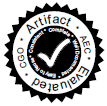| Paper decision: | |
| Artifact submission: | |
| Technical clarification: | 4 December 2017 |
| Decision announced: | |
| Camera ready paper version: | |
| Public CGO-PPoPP AE discussion: | 26 Feb 2018 (17:15) |
CGO'18 AE Chairs:
Michel Steuwer
(University of Glasgow, UK)
Grigori Fursin
(cTuning foundation / dividiti)
AE SC:
Grigori Fursin,
Bruce Childers

|
Artifact Evaluation for CGO 2018 |
Artifact evaluation is over - see accepted artifacts here !
Authors of accepted CGO 2018 papers are invited to formally submit their supporting materials to the Artifact Evaluation process (AE). AE is run by a separate committee whose task is to reproduce (at least some) experiments and assess how submitted artifacts support the work described in the papers. This submission is voluntary and will not influence the final decision regarding the papers.
The papers that successfully go through AE will receive a set of ACM badges of approval printed on the papers themselves and available as meta information in the ACM Digital Library. Authors of such papers will have an option to include their Artifact Appendix to the final paper (up to 2 pages). Authors are also encouraged (though not obliged) to make these materials publicly available upon publication of the proceedings, by including them as "source materials" in the Digital Library.
If you have any questions, please check AE FAQs and do not hesitate to contact AE chairs and the steering committee or post your question to our LinkedIn group.
How to submit
Please prepare your artifacts for submission using the following guide. Then, log into the CGO AE HotCRP website - you will see the papers you submitted to CGO. Please select your accepted paper and edit the submission to upload a pdf of your paper with an appendix describing how to access and validate your artifacts. You should also mark possible conflicts of interests with AE committee members.Note that we collaborate with ACM to unify packing and sharing of artifacts as reusable and customizable components with a unified JSON API with the help of the Collective Knowledge framework (see ACM announcement). You are not obliged to use CK and can write your own scripts to prepare and run experiments. However if you are interested to try it, cTuning foundation offers free help to convert your workflows to the CK format while reusing already existing artifacts (for example, see reusable AI artifacts) for your submission. Feel free to contact Grigori Fursin as soon as possible for more details. Please, check out a distinguished artifact from CGO'17 which was shared using the CK framework: GitHub, PDF with appendix.
Reviewing process
Your artifacts will be reviewed according to the following guidelines. Artifacts receiving "met expectations" or above score will pass evaluation and will receive related stamps of approval.
If you have questions, comments and suggestions on how
to improve artifact submission, reviewing, customization
and reuse, please do not hesitate to get in touch with
the AE chairs and/or steering committee!